
One of the most curious things about the film adaptation of Andrew Lloyd Webber's Evita is that nearly all the scenes featuring Political Power, such as the famous "Don't Cry for Me Argentina" moment, are filmed off-balance.
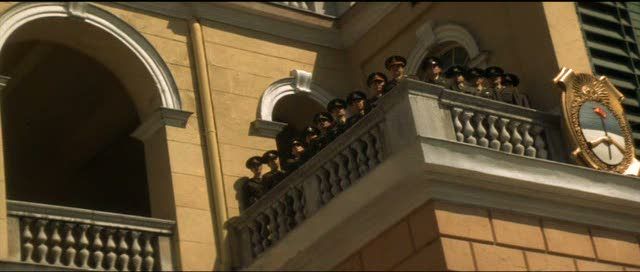
The Old Guard, off-balance.
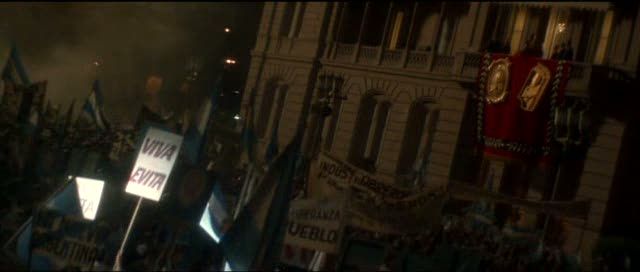
The rise of the Peróns; the tilt worsens.
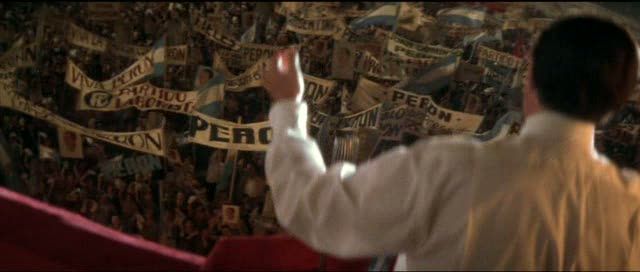
Vertiginous heights!
It's a clever visual reminder of both the delirious heights Eva and Juan Perón find themselves in by the halfway mark of this movie, as well as the unsteady base they've founded their power on. It's a castle built on quicksand, and - amid the eerie, minor-chord chanting of "Perón! Perón!"/"Eviiiita!" - the spotlight reels drunkenly and the framing is permanently off-kilter. This famous sequence is then gloriously bookended by "And the Money Kept Rolling In (And Out)", which is a montage of the Perón government hemhorraging funds - into hospitals, into infrastructure, into bread and circuses and their own pockets.
A confession: we watch Evita with the same regularity that some people go on holiday. We kinda like it. (Kinda big time.)
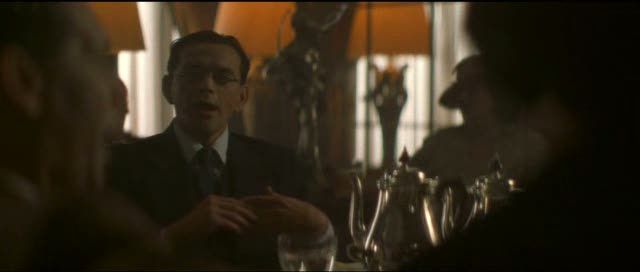
Our favorite "oligarch". We look out for him in all the snobby, rich people numbers!
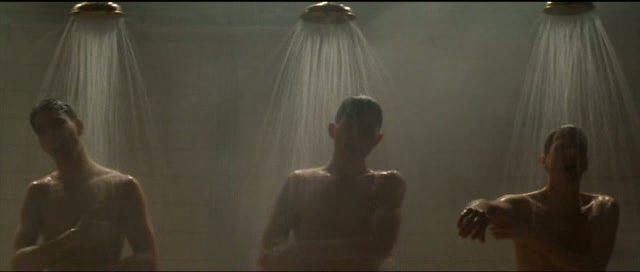
Though when the chorus sings as a big crowd, or line of military drones, it's scary.
For economists, Argentina is a strange beast. One hundred years ago, it was poised to be one of the next great powers, growing fast and making money. By the 2010s, it had fallen far below that potential. And in between? The Peróns. (Okay, and a lot of other stuff - like the crisis in 1999 - but saying "The Peróns." sounds a lot more dramatic and exciting.)
Yet this musical acknowledges the magnetic charisma of Juan and Eva. Following Eva Duarte (Madonna), who later became known by the loving diminutive "Evita", as an ambitious social climber, we begin in the poor town of Los Toldos, quickly move to the heady nights of Buenos Aires as Eva sleeps her way onwards and upwards, eventually landing in the bed of Juan Perón (Jonathan Pryce, in a big fake... nose). Perón, an influential military man, is slowly making his way up the ladder as well. They agree - in the jazzy number "I'd Be Surprisingly Good For You" - to team up, and, well, Jonathan Pryce and Madonna are an unlikely and unexpectedly hot duo.
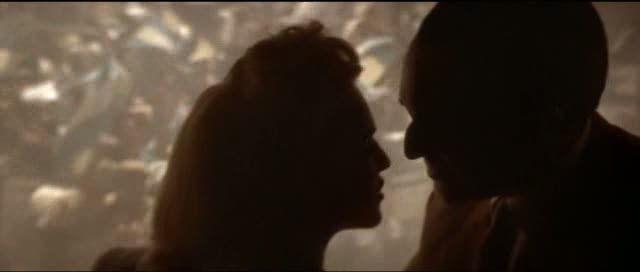
Love!
Or so think the screaming crowds (and the PPCC), who - as governments topple, riots break out and buildings burn down - catapult the Peróns and their new, labor-friendly rhetoric into the Casa Rosada.
This film is all about glory, legends, cynical politics, big promises that kind of ambiguously follow through, and, of course, crowd control. So it's a lot like Webber's other PPCC favorite, Jesus Christ Superstar. As in JCS, the mob - amorphous, impatient, demanding and, above all, LOUD - is more than spectator. It is the important third character, getting in the way between the Father and Son, between Juan and Eva. If we were Žižek, we'd say it was the id to Juan's/God's superego and Eva's/Jesus' ego - the mob is unmanageable, impulsive, dangerous and hypnotic. It is the ugly, scary, Dionysian part of being human.
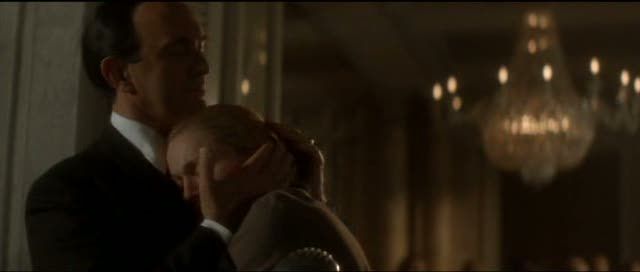
Juan and Eva as the superego and ego, respectively, trying to manage...
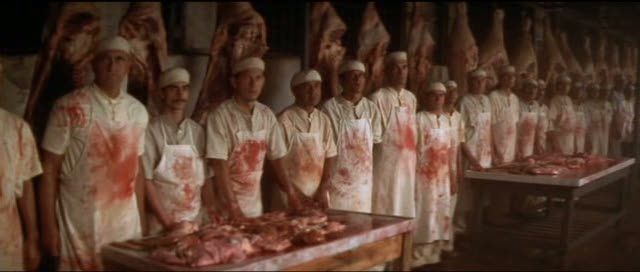
Their fickle id.
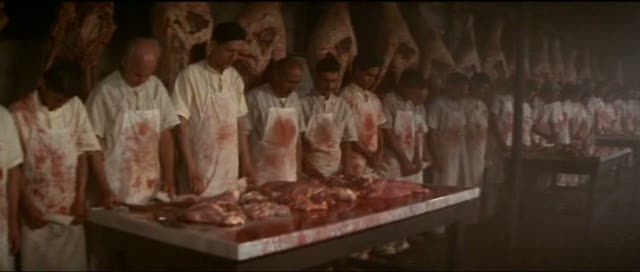
(Note: these two moments are separated by practically the entire film. Such is the genius of the editing.)
In Evita, that crowd is also represented by none other than Ché (Antonio Banderas, not a cat here), ultra-popular populist icon. Ché is forever pushing and shoving his way between people, getting beaten up by policemen, standing in factory lines, gazing cynically at the lather everyone is frothing around in. Literally, he stays grounded. And so often voices Jiminy Cricket-like asides, meets Eva in dreamscapes where they discuss what the hell she thinks she's doing, and sometimes - for the help of those ignorant of Argentine (Argentinian?) history - summarizes things.
Ever since reading about Pablo Escobar building hospitals in the marvelous Cocaine: A Definitive History
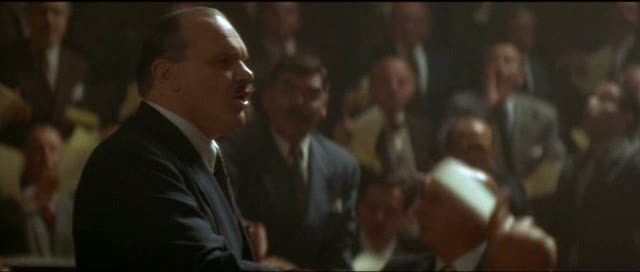
This guy getting torn down in Parliament reminded us of Italian parliament, circa 2008!
About the impact of the film. Well: as we said above, we watch it a lot. It's one of our favorite things (apart from packages wrapped in brown paper tied up with string). When Madonna tells us not to cry for her, we do - oh, how we do. It's a spectacle. When Jonathan Pryce's vibrato voice bellows into the microphone - "Arrrrgentinos! Arrrrgentinos!" - we get goosebumps. "Descamisados! Mis companeros!" Webber's music is as easy and Puccini-fied as it's always been. Transferring the musical from Broadway to film naturally lost some of the excellent original cast - Patti LuPone as Eva and poor, beautiful Mandy Pantinkin (!) as Che - in favor of bigger names. Madonna is fine, as is Jonathan Pryce - duh, they're professional singers. Antonio Banderas strains a bit, but he makes up for it by playing an obese cat 14 years later (so funny! so cute! oh, fat cats lolz!). We try to dress up our long-simmering, low-fi crush on Jonathan Pryce by saying that we like him because of Brazil, Terry Gilliam's 1980s dystopian classic. We reckon that sounds cooler than admitting that we just think he's sexy in an arched eyebrow, vibrato, Welsh way. In a big fake nose way.
Now someone Christian Dior me! Lauren Bacall me! Machiavell-me!

